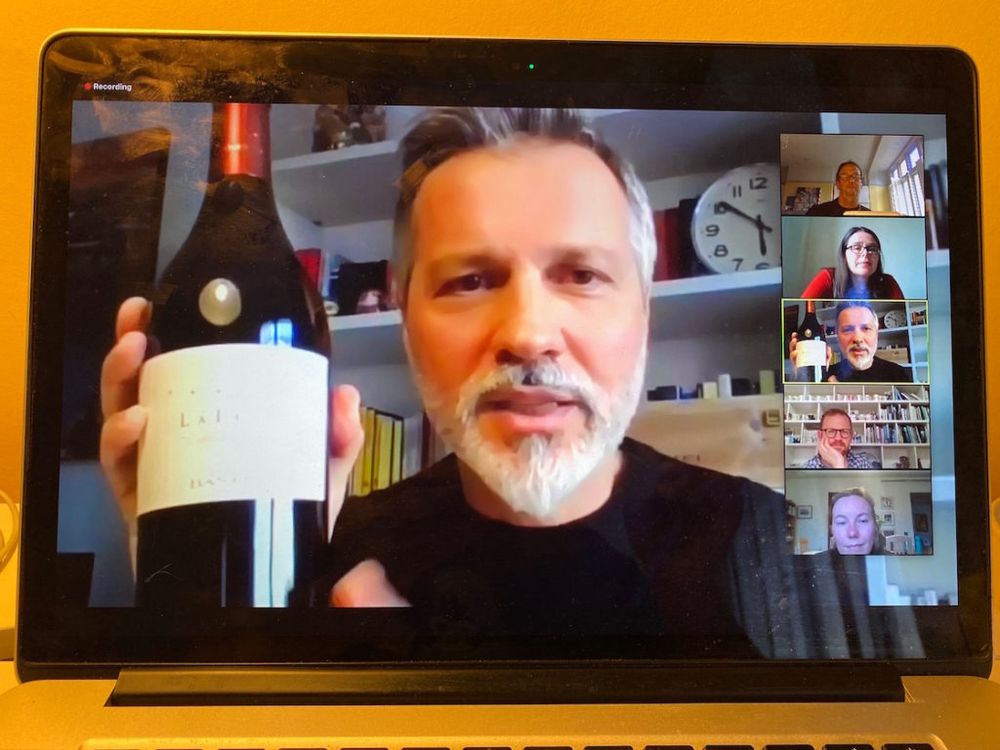Jgor Marini was speaking to Louis Latour Agencies’ head of London sales Will Hine in the first of four Zoom-powered seminars called ‘Life Under Lockdown: How is the Italian Wine Industry reacting to Coronavirus.’
Some of the innovations being seen in Italy include:
- Only using 10% of key workers at winery and rotating staff
- Slowing down operations – for safety
- Using extended family in the vineyards to cover absent migrant workers
- Looking at massive green harvest in July/ August
- Looking at distilling overstock into pure alcohol (sanitizers)
- Not over-loading export pipelines
WITH ITALY SO BADLY hit by the Coronavirus and the resulting lockdown one of the world’s strictest, keeping Castello Banfi, one of Tuscany’s largest and most influential wine producers in operation has required lessons to be learned… and fast.
Since lockdown started on March 10 many key industries such as car manufacture and textiles have been shut down.
“Restrictions are getting much more strict now. Everything that is related to the first consumption of goods, though, is still working, for example all of the factories that are supplying the chains can still work (eg. plastic pots for yoghurt),” explains Banfi regional manager Jgor Marini.
“But for wines we can do almost everything. Nowadays everyone can still go in the fields, we have 3,000 hectares so workers can be like normal, except they have to wear masks but everything about agriculture is completely safe.”
Dealing with the lack of migrant workers
A measure introduced by the Italian government that is helping the wine industry in general, particularly small family businesses is that all the relatives up to the 6thdegree of relationships can work for free in the wineries with no fines for being out of the home.
“If you have a cousin, a third cousin in the neighbourhood, say, who’s doing nothing because their company has been locked down he can help you and support you in the fields. The problem is that usually there are 370,000 foreign workers in agriculture in Italy and they’re not allowed to come so all the operations that need to be done in the vineyard now, need to be done somehow – this is very clever to keep people active but also to help people keep in business.”
“Here in Montalcino at the end of April you need to manage the canopy, the irrigation – if you don’t have enough people working in your agriculture it’s a double damage for your business.”
Working with 10% of workforce on rotation
Where a company the size of Banfi has had to innovate is to box clever with its workforce – being able to rotate staff at the winery so that there is never more than 10% of the workforce there at any one time, thereby getting around any resulting quarantine issues should someone test positive for the virus.
“The biggest risk for us is that the winery is locked down. The most important topic is that if we have a single case of COVID-19 in the company all of those who were in touch with him should stay quarantined. The winery like the agriculture must never stop, there is a large amount of wine that needs to be managed, aged, bottled, filtered and so to do this we are working with 10% of employees; so if it is normally 20 people there is only 2 who work for 6 hours and then we change by rotation,” says Marini.
With sales and marketing teams working from home Marini says that the Human Resources team has now become the most crucial part of the company.
“They have to take care about all those measures that the Italian government is taking. To cover the salaries and to protect the workers in general.”

At the end of the seminar, Marini held up a bottle of Banfi’s LaLus (‘The Light’) to signify the light at the end of the tunnel, April 1, 2020
Pure alcohol and green harvest to deal with over-stocking
Marini says that with staff-rotation and keeping the company safe operations have had to slow down considerably (“everyone in wine has had to learn to be patient”) but the company is still selling wine worldwide, and in some markets like Scandinavia sales are actually increasing.
The problem that he is most focussed on, however, is over-stocking.
“The problem is when you are over-stocking wines and you cannot sell for 2 or 3 months – the risk is when the new vintage is coming in about September time we will have two vintages in stock at the same time which is a big problem in terms of sales but also to manage the warehouse.”
One way of overcoming overstocking and not losing money is wineries looking to distil pure alcohol.
“A proposal from one of the association of wine producers is to distil the overstock for two reasons – first to get free room in their warehouses, second because there is a big demand in supermarkets for alcohol (for hand sanitizers and cleaning in general) – demand is 180% more than it usually is and there is no more alcohol bottle in supermarkets – so some of the big wineries are converting production into pure alcohol.”
“Having a larger than normal green harvest is another proposal to reduce the crops of the 2020 vintage – so if we are still overstocked with the 2019, the risk is not to have enough room for the new wines,” Marini says.
“A couple of associations are suggesting to make a very huge green harvest in August or July to reduce the crops and yields per hectare of table wines so as not to over-produce wines again and to help growers in appellations (ie. premium wines).”
The effects of the US slowdown
Castello Banfi is unusual in that it is an American-Italian company, so the US importer has good stock levels, however, other wineries may well suffer as a result of too much pipeline filling.
“In America now we are suffering a lot, and from say the second week of March most of the Italian wineries were suffering a lot and trying to send as much wine there as possible before lockdown – many of the wineries were feeding their importers with a lot of wines – which is double risky – because it is difficult to sell out now because of lockdown in the US and the second reason is that when the new vintage is ready they will probably have old vintages in stock – so all the new easy going white wines that should be fresh, say Pinot Grigio, when the new 2020 is ready they will still have old 2019s in stock. So it will be even slower than today – which is the biggest risk.”
So how are sales going in Italy?
“We are still able to sell wine, on-trade is absolutely zero because restuarants, bars and most of the wine shops are closed, but supermarkets are still running very well and on the other side, the little wine shops that are considered to be crucial for life on a little block in a town they can still be open, and sales for delivery wines at home.”
“In the first week of the lockdown sales increased by 7% and are now increasing. In areas where the virus was quite big trouble they are 13 – 14% increase in supermarkets and online sales are 100% more than they were at beginning of March and in some areas of the North like Lombardy they are plus 500% sales which is very good as it keeps us alive.”
“In the first week of lockdown the best sellers were Barolo, Brunello, Champagne let’s say fine, premium wines, but then now two weeks later the decrease in premium wines is 70%, and wines from €6-12 are the most sold online – these are 400-500% increases and the same for the supermarket. The reason is that in the first week of lockdown things were unpredictable so they were spending but now they are not safe about their salary and they do not know what is going to happen in the future so they save a bit more, or to drink a bit more wine for lower money, everybody’s doing this in Italy.”
Some issues with export
Banfi sells 80% of its production in export and 20% domestically, the rise in sales of the latter keeping the company’s sales teams busy.
“We can still supply importers all over the world. One difficulty is in delivering bespoke label wine for, say, supermarkets in the US, but the biggest problem is the collection which is even more challenging than the production or the preparation of the goods. If an importer is sending a courier they need to pass all the big borders, customs, get through on the roads etc. Companies like the Scandinavian monopoly – they are still selling wine, sales keep on going, and they are placing orders but struggling with their couriers. So it is still going but a little slowly.”
The light at the end of the tunnel?
“The Italian government has just said today that the measures, the lockdown, will for sure be until Easter but there’s a little positive note of a slight re-opening in May 4th– this is not official but at least it’s a good way to start again – we can see the light at the end of the tunnel.”
“As for I try to work as much as I can, meet as many people as possible, get in contact with our partners all around the world and get conversations going to try and develop ideas for the future.”






























